
The Gut-Immune Connection: How Healthy Digestion Boosts Your Immunity
Cayla MandeanWe've covered the skin microbiome before, but did you know your gut also contains trillions of bacteria? This is known as the gut microbiome. Supporting this intricate ecosystem is crucial, as approximately 70% of our immune system is housed within the digestive tract. This underlines the importance of a healthy and balanced digestive system in strengthening overall health and well-being.
The Gut Microbiome: A Protective Ecosystem
The gut microbiota, commonly known as gut flora, is a complex community of trillions of microorganisms, including bacteria, viruses, and fungi - that live in the intestines. These microbes play crucial roles in digesting food, producing essential nutrients, and protecting against organisms that cause disease. A diverse and balanced gut microbiome is key to gut health and ultimately, a healthy immune and nervous system. Research has shown that an imbalance in this microbial community, known as dysbiosis, can lead to weakened immune responses and increased susceptibility to infections and diseases. Poor gut health can also lead to various external symptoms such as acne, eczema, and dull, unhealthy skin, and has been linked to neurological and mental health conditions. That's why we must prioritise gut health to improve our overall well-being and resilience.
Probiotics and Prebiotics: Nurturing Your Gut Health
Supporting your gut health can significantly support your immune system and promote a radiant and healthy you. Probiotics, the beneficial bacteria found in supplements and fermented foods like yogurt, kefir, and sauerkraut, can help maintain or restore a healthy gut microbiome. Studies have shown that probiotics can enhance the body's immune response by increasing the production of natural antibodies and boosting the activity of immune cells. Prebiotics, on the other hand, serve as food for these beneficial bacteria. By promoting the growth of good bacteria, prebiotics help maintain a balanced microbiome and support immune function. Foods rich in prebiotics include garlic, onions, bananas, whole grains, and so much more. To put it simply, probiotics are beneficial bacteria, and prebiotics are food for these bacteria and you need both to support gut and consequently, immune health. By nourishing our gut microbiome with a diet rich in prebiotics and probiotics, we can cultivate beauty from the inside out, fostering a strong immune system, clear skin, and overall vitality. Embracing this holistic approach to well-being aligns perfectly with the philosophy of natural and sustainable living, allowing us to thrive in harmony with the intricate ecosystems within our bodies.
To support your body's natural defence, here's a recipe incorporating probiotics and prebiotics:









